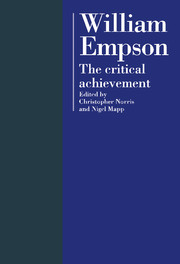Book contents
- Frontmatter
- Contents
- Contributors
- Foreword
- 1 Introduction: Empson as literary theorist: from Ambiguity to Complex Words and beyond
- 2 Empsonian honesty and the beginnings of individualism
- 3 Empson, Leavis, and the challenge of Milton
- 4 Empson's Satan: an ambiguous character of the seventh type
- 5 Compacted doctrines: Empson and the meanings of words
- 6 Figural narrative and plot construction: Empson on pastoral
- 7 More lurid figures: de Man reading Empson
- 8 Fool and pharmakon
- 9 William Empson's cosmicomics
- 10 Empson as teacher: the Sheffield years
- References
- Index
Foreword
Published online by Cambridge University Press: 01 June 2011
- Frontmatter
- Contents
- Contributors
- Foreword
- 1 Introduction: Empson as literary theorist: from Ambiguity to Complex Words and beyond
- 2 Empsonian honesty and the beginnings of individualism
- 3 Empson, Leavis, and the challenge of Milton
- 4 Empson's Satan: an ambiguous character of the seventh type
- 5 Compacted doctrines: Empson and the meanings of words
- 6 Figural narrative and plot construction: Empson on pastoral
- 7 More lurid figures: de Man reading Empson
- 8 Fool and pharmakon
- 9 William Empson's cosmicomics
- 10 Empson as teacher: the Sheffield years
- References
- Index
Summary
Editing this book has been an enjoyable task for various reasons, not least the unfailing helpfulness and generosity of my contributors, the encouragement received at every stage from Kevin Taylor and Josie Dixon of Cambridge University Press, and the welcome opportunity to reread Empson in the company of colleagues and students, some of them encountering his work for the first time. As the essays came in I often asked myself how Empson might have responded had he lived to offer comments on their many and varied lines of approach. In 1978 I sent him the proofs of my own early book (William Empson and the Philosophy of Literary Criticism) and invited him to write a short postscript addressing any points of interest or passages where he thought I had got him wrong. The result was a mild but firm rebuke in the familiar late-Empson manner, remarking that the book had caused him to wonder ‘whether my work deserved such devoted scrutiny, or at least to wish I had not written so confusedly that it was needed’. Moreover, Norris's kind intentions turned out to have sharp limits; ‘anything I had printed for the last quarter of a century was irrelevant nonsense, to be dismissed briefly with a sigh’. So yes, he would write the postscript as requested, but wanted to make it clear that - pace Norris - ‘I have not been entertaining myself with frippery in my old age; … I have continued to try to handle the most important work that came to hand’.
- Type
- Chapter
- Information
- William EmpsonThe Critical Achievement, pp. xi - xivPublisher: Cambridge University PressPrint publication year: 1993



